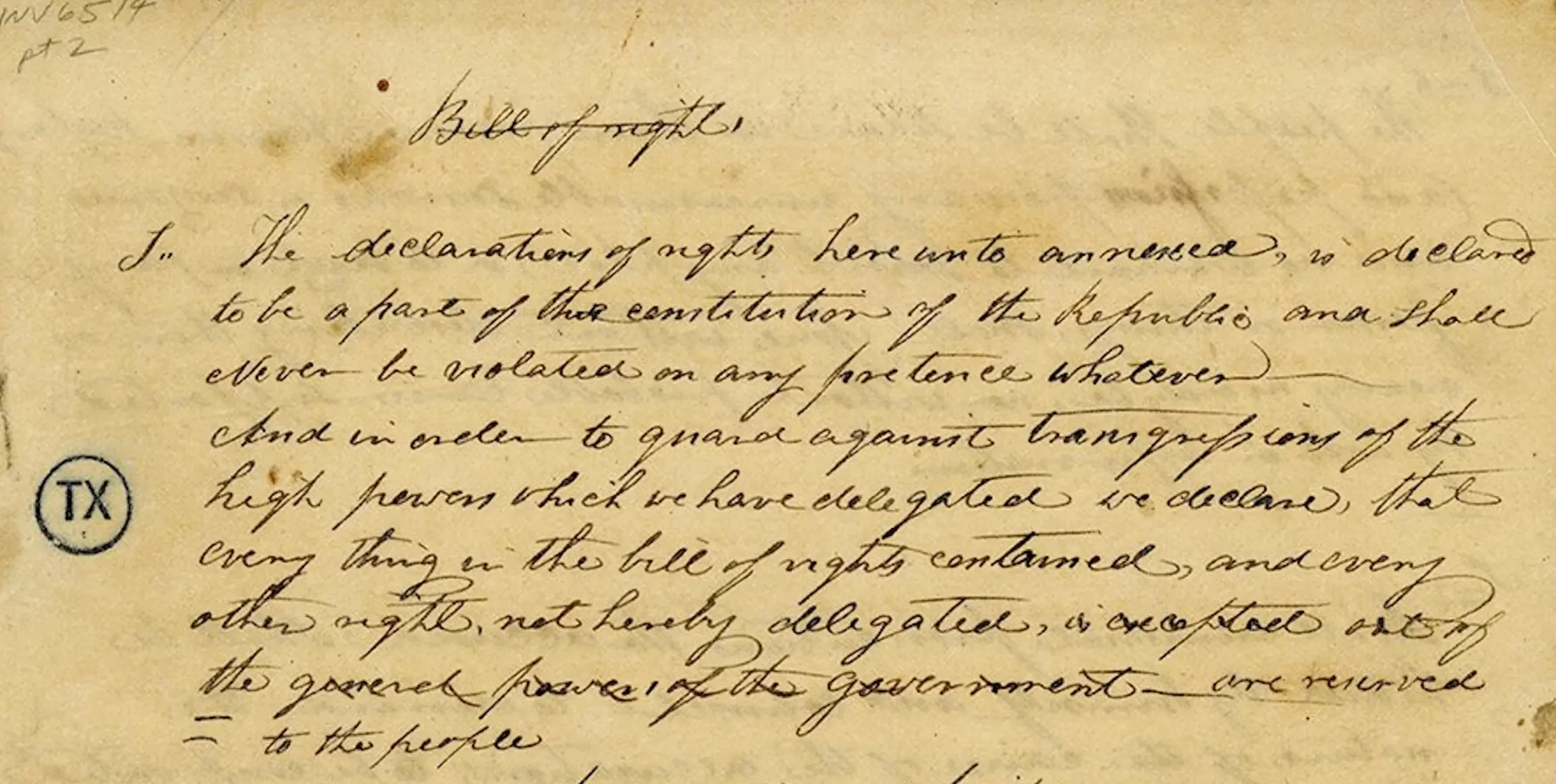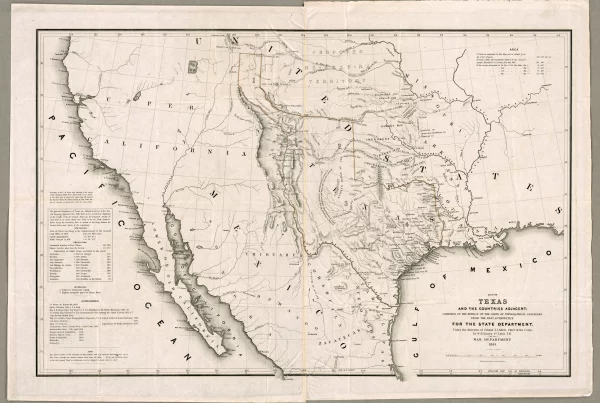The Texas Bill of Rights is a section of the Texas Constitution that outlines and protects the individual rights and liberties of the citizens of Texas. It serves as a cornerstone of Texas law, ensuring that the government does not infringe upon the fundamental freedoms of its people. It was adopted as part of the Texas Constitution of 1876 and has been amended over time, expanding from the original 29 sections to 34 today.
The Texas Bill of Rights establishes protections against governmental power, ensuring individual freedoms such as freedom of speech, religion, and the press, as well as specific rights related to property, criminal justice, and due process.
Though similar to the United States Bill of Rights, the Texas Bill of Rights includes some distinctive provisions tailored to the state’s unique legal and historical context.
Item-by-Item Summary of the Texas Bill of Rights
Sovereignty of Texas (Section 1): This section asserts the sovereignty of Texas as a state and the freedom of its people. It acknowledges that the people of Texas hold ultimate authority, much like the preamble of the U.S. Bill of Rights, which starts with “We the People.”
Right to a Republican Form of Government (Section 2): Texas guarantees that the government will be Republican in form, meaning it will be based on the rule of law and popular sovereignty. While the U.S. Constitution guarantees the same, this section emphasizes Texas’ commitment to these principles specifically within the state’s own governance.
Religious Freedom (Section 6): The Texas Bill of Rights guarantees the freedom to worship as one chooses and prohibits government interference in religious practices. This mirrors the U.S. Bill of Rights’ First Amendment, but includes additional language prohibiting the use of public funds for religious purposes and requiring that state laws not discriminate in favor of one religion or another.
Freedom of Speech and Press (Section 8): Similar to the First Amendment of the U.S. Bill of Rights, this section ensures the freedom of speech and of the press. However, it also specifically grants individuals the right to seek redress of grievances against the government, further empowering citizens to challenge governmental authority.
Protection Against Unreasonable Searches (Section 9): This section protects citizens from unreasonable searches by law enforcement, requiring warrants for searches or seizures, supported by an oath or affirmation of probable cause. This provision closely mirrors the Fourth Amendment of the U.S. Bill of Rights, which similarly guarantees protection against unreasonable searches and seizures. Both emphasize privacy rights and the need for legal safeguards against arbitrary government actions.
Right to a Speedy Trial (Section 10): This section protects citizens from detention without trial. A citizen who is accused of a crime must be swiftly brought to trial or released. Every citizen has a right to trial by jury, though in practice this is a right that defendants often waive. The right to a trial by jury is similarly enshrined in the Sixth and Seventh Amendments of the U.S. Constitution, with the Texas Constitution offering additional detail on jury selection and the role of the jury in both civil and criminal cases.
Criminal Justice Protections (Sections 10-11, 12, 14, 15, 16) These sections deal with a range of criminal justice protections, including the right to bail, prohibition on excessive fines, the right to a speedy trial, protection against self-incrimination, and protection against cruel and unusual punishment. These align closely with protections under the Fourth, Fifth, Sixth, and Eighth Amendments of the U.S. Constitution, but the Texas Constitution provides further detailed language, particularly on the right to bail. In recent years, bail reform has become a contested issue, with courts and lawmakers debating risk-based assessments versus cash bail, and lawsuits challenging wealth-based detention practices.
Access to the Courts (Section 13): This section states that access to the courts for the redress of injuries is a fundamental right and cannot be denied. While the U.S. Constitution protects this right under the Due Process Clause of the Fifth and Fourteenth Amendments, Texas explicitly reaffirms this principle in the Bill of Rights.
Protection from Ex Post Facto Laws (Section 16): This section prevents the government from passing laws that retroactively punish people or declare individuals guilty without trial, similar to the U.S. Constitution’s provisions found in Article I, Section 9 and Section 10.
Due Process and Equal Protection (Sections 13 and 19): Sections 13 and 19 guarantee due process of law, the protection against double jeopardy, and the right to an impartial jury. These rights parallel the Fifth and Sixth Amendments of the U.S. Constitution. However, Texas adds further protections such as ensuring no citizen may be imprisoned without a trial and that no one shall be “deprived of life, liberty, or property except by the due course of the law.”
The Right to Keep and Bear Arms (Section 23): This provision protects the right of Texans to keep and bear arms, akin to the Second Amendment in the U.S. Constitution. However, Texas law emphasizes the state’s right to regulate the use of firearms, which may be more strictly interpreted than the federal government’s stance.
Right to Assemble and Petition (Section 27): This section protects the right to peaceably assemble and petition the government for grievances. It is similar to the First Amendment of the U.S. Constitution, though it highlights the specific role of the people in holding the government accountable through petitions.
Right to Property (Sections 17 and 19): Texas grants strong protections against the seizure of private property without due process or just compensation. While this is similar to the Fifth Amendment of the U.S. Bill of Rights, Section 17 explicitly guarantees that private property cannot be taken for public use unless compensation is provided, reinforcing the protection of private land ownership in Texas.
Protection from Slavery (Section 18): This provision prohibits slavery and involuntary servitude, except as a punishment for a crime. It aligns with the 13th Amendment of the U.S. Constitution but is noteworthy in its emphasis on the context of criminal punishment.
Key Differences Between the Texas and U.S. Bill of Rights
Although both the Texas and U.S. Bills of Rights share many similarities in terms of protecting individual freedoms, there are several important differences:
- Religious Freedom: While the U.S. Bill of Rights prohibits the establishment of religion and ensures free exercise, the Texas Bill of Rights adds a unique clause that forbids public funds from being used for religious purposes, emphasizing the state’s separation of church and state.
- Gun Rights: Both the Texas and U.S. Bill of Rights protect the right to bear arms. However, the Texas version includes specific language that reflects the state’s history of frontier life, including the idea of personal self-defense and the preservation of order in a large state. Texas law also tends to be more permissive regarding gun ownership than federal law.
- Due Process and Property Rights: While both documents emphasize due process, the Texas Bill of Rights includes more expansive provisions protecting citizens’ property rights, especially in cases of eminent domain.
- Criminal Justice: The Texas Bill of Rights contains more detailed protections around criminal law, particularly regarding the right to bail and prohibitions against cruel and unusual punishment. This includes specifics about not subjecting individuals to excessive fines or bail, which is less emphasized in the federal Bill of Rights.
- State Sovereignty: The Texas Bill of Rights places significant emphasis on the sovereignty of the state itself, asserting that the people of Texas retain ultimate authority over the state government, a provision not found in the U.S. Bill of Rights.
While the Texas Bill of Rights and the U.S. Bill of Rights share common principles rooted in protecting individual liberties, the Texas version reflects the unique historical, cultural, and legal context of the state. It provides some additional protections that emphasize the rights of citizens to challenge government actions, the sanctity of property, gun rights, etc.



